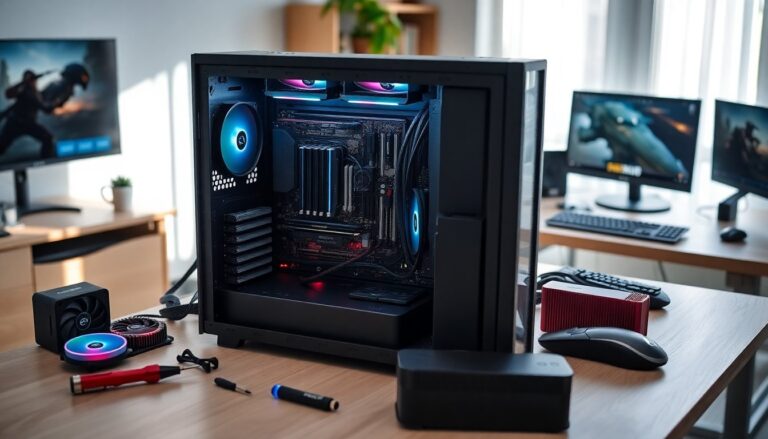Argomenti trattati
Building a gaming PC is both an exciting and rewarding endeavor. Tailoring your setup to your specific gaming preferences allows you to achieve stunning graphics, high frame rates, and immersive experiences. This guide highlights the critical components, functionalities, and considerations necessary for constructing an exemplary gaming rig.
PCs in gaming are designed to handle intensive tasks that require robust hardware and finely-tuned configurations. This article explores the primary functionalities that define a high-performance gaming PC.
Understanding gaming workloads
At the heart of any gaming PC is its ability to manage high-performance gaming. This includes playing the latest AAA games at impressive resolutions like 1440p or 4K, ensuring every visual detail shines without lag. A powerful graphics processing unit (GPU), ample RAM, and a swift central processing unit (CPU) are essential for a seamless gaming experience.
Advanced features and multitasking
Modern titles often utilize advanced visual techniques such as ray tracing, which enhances realism through sophisticated lighting and shadows. To fully leverage these features, a high-end GPU paired with a multi-core CPU is crucial for optimal performance. Furthermore, many gamers use their setups for streaming or content creation, necessitating a system that can efficiently handle gaming and broadcasting simultaneously.
For tasks such as editing 4K videos or rendering complex graphics, the computational power of a gaming PC is invaluable. This versatility makes it ideal for creators seeking a single device for both gaming and professional work. Additionally, the rise of virtual reality (VR) has increased the demand for powerful systems capable of delivering immersive environments. A VR-ready GPU, fast storage, and sufficient RAM are essential for a smooth VR experience.
Key components of a gaming PC
Constructing a gaming PC requires careful selection of components that work together to achieve the desired performance. The foundational elements include:
The processor, which serves as the central nervous system of the PC, is vital for ensuring fluid gameplay and efficient multitasking. Opt for a multi-core CPU with elevated clock speeds; a minimum of six cores is recommended for gaming, while enthusiasts might consider eight or more for future-proofing.
The graphics card is critical for gaming performance, as it is responsible for rendering images, textures, and visual effects. Investing in a top-tier GPU is essential for maintaining smooth frame rates across high resolutions, especially in games featuring advanced graphics.
Memory and storage considerations
Equally important, RAM enables the smooth operation of games and applications. Ideally, a gaming PC should feature at least 16 GB of RAM, while 32 GB is advisable for those who multitask or run demanding applications. Faster RAM speeds can further enhance performance, particularly in memory-intensive games.
Storage solutions significantly impact loading times and overall system responsiveness. Solid-state drives (SSDs) are preferred for gaming setups due to their rapid read and write capabilities. A combination of an SSD for the operating system and key games, along with a hard disk drive (HDD) for additional storage, strikes a balance between speed and capacity.
Building for the future
PCs in gaming are designed to handle intensive tasks that require robust hardware and finely-tuned configurations. This article explores the primary functionalities that define a high-performance gaming PC.0
PCs in gaming are designed to handle intensive tasks that require robust hardware and finely-tuned configurations. This article explores the primary functionalities that define a high-performance gaming PC.1
PCs in gaming are designed to handle intensive tasks that require robust hardware and finely-tuned configurations. This article explores the primary functionalities that define a high-performance gaming PC.2
PCs in gaming are designed to handle intensive tasks that require robust hardware and finely-tuned configurations. This article explores the primary functionalities that define a high-performance gaming PC.3
The benefits and challenges of building a gaming PC
PCs in gaming are designed to handle intensive tasks that require robust hardware and finely-tuned configurations. This article explores the primary functionalities that define a high-performance gaming PC.4
PCs in gaming are designed to handle intensive tasks that require robust hardware and finely-tuned configurations. This article explores the primary functionalities that define a high-performance gaming PC.5
PCs in gaming are designed to handle intensive tasks that require robust hardware and finely-tuned configurations. This article explores the primary functionalities that define a high-performance gaming PC.6

